Business Law Case Study: Analyzing Ethical Dilemmas in Workplace
VerifiedAdded on 2023/03/23
|5
|1024
|33
Case Study
AI Summary
This case study presents an ethical dilemma faced by Ilnaz, who must balance her job requirements with her religious and cultural beliefs. The analysis employs Teleological and Deontological ethics to navigate the conflict, considering both the consequences of her actions and their moral implications. The solution involves a careful discussion with her manager, referencing the Australian Computer Society (ACS) code of ethics and the Work Place Gender Equality Act of 2012 to ensure a fair and professional resolution that respects both her values and workplace equality. This document is available on Desklib, a platform offering AI-based study tools and solved assignments for students.
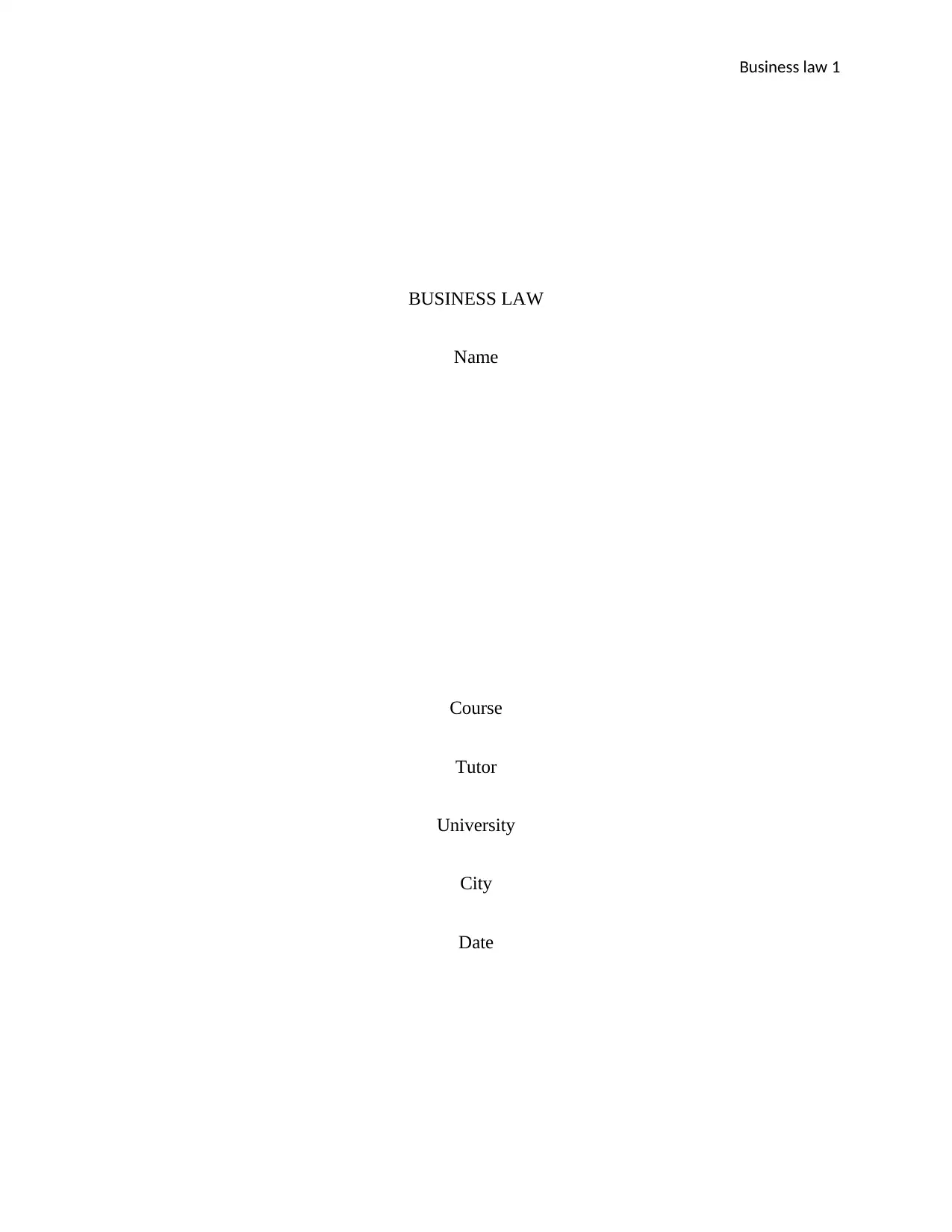
Business law 1
BUSINESS LAW
Name
Course
Tutor
University
City
Date
BUSINESS LAW
Name
Course
Tutor
University
City
Date
Paraphrase This Document
Need a fresh take? Get an instant paraphrase of this document with our AI Paraphraser
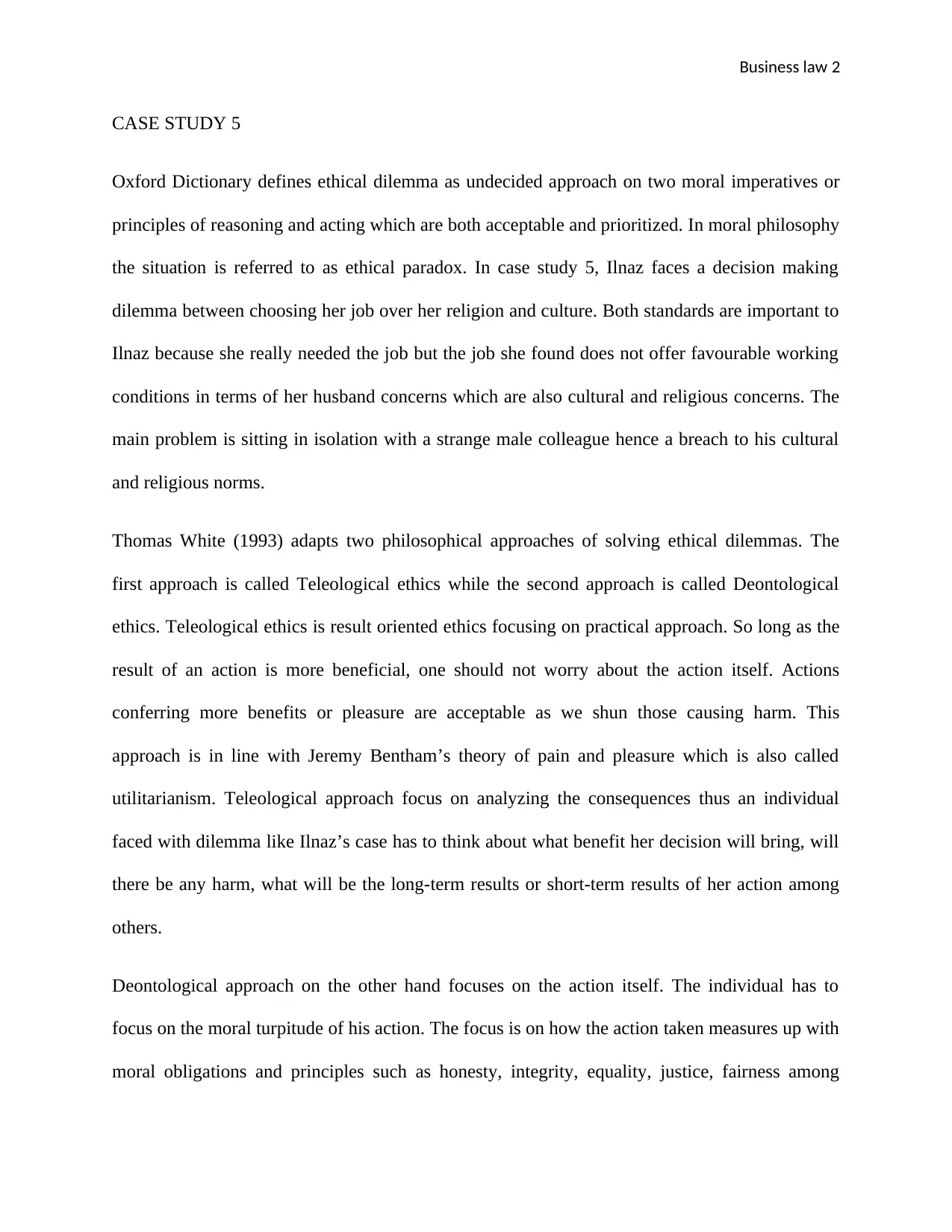
Business law 2
CASE STUDY 5
Oxford Dictionary defines ethical dilemma as undecided approach on two moral imperatives or
principles of reasoning and acting which are both acceptable and prioritized. In moral philosophy
the situation is referred to as ethical paradox. In case study 5, Ilnaz faces a decision making
dilemma between choosing her job over her religion and culture. Both standards are important to
Ilnaz because she really needed the job but the job she found does not offer favourable working
conditions in terms of her husband concerns which are also cultural and religious concerns. The
main problem is sitting in isolation with a strange male colleague hence a breach to his cultural
and religious norms.
Thomas White (1993) adapts two philosophical approaches of solving ethical dilemmas. The
first approach is called Teleological ethics while the second approach is called Deontological
ethics. Teleological ethics is result oriented ethics focusing on practical approach. So long as the
result of an action is more beneficial, one should not worry about the action itself. Actions
conferring more benefits or pleasure are acceptable as we shun those causing harm. This
approach is in line with Jeremy Bentham’s theory of pain and pleasure which is also called
utilitarianism. Teleological approach focus on analyzing the consequences thus an individual
faced with dilemma like Ilnaz’s case has to think about what benefit her decision will bring, will
there be any harm, what will be the long-term results or short-term results of her action among
others.
Deontological approach on the other hand focuses on the action itself. The individual has to
focus on the moral turpitude of his action. The focus is on how the action taken measures up with
moral obligations and principles such as honesty, integrity, equality, justice, fairness among
CASE STUDY 5
Oxford Dictionary defines ethical dilemma as undecided approach on two moral imperatives or
principles of reasoning and acting which are both acceptable and prioritized. In moral philosophy
the situation is referred to as ethical paradox. In case study 5, Ilnaz faces a decision making
dilemma between choosing her job over her religion and culture. Both standards are important to
Ilnaz because she really needed the job but the job she found does not offer favourable working
conditions in terms of her husband concerns which are also cultural and religious concerns. The
main problem is sitting in isolation with a strange male colleague hence a breach to his cultural
and religious norms.
Thomas White (1993) adapts two philosophical approaches of solving ethical dilemmas. The
first approach is called Teleological ethics while the second approach is called Deontological
ethics. Teleological ethics is result oriented ethics focusing on practical approach. So long as the
result of an action is more beneficial, one should not worry about the action itself. Actions
conferring more benefits or pleasure are acceptable as we shun those causing harm. This
approach is in line with Jeremy Bentham’s theory of pain and pleasure which is also called
utilitarianism. Teleological approach focus on analyzing the consequences thus an individual
faced with dilemma like Ilnaz’s case has to think about what benefit her decision will bring, will
there be any harm, what will be the long-term results or short-term results of her action among
others.
Deontological approach on the other hand focuses on the action itself. The individual has to
focus on the moral turpitude of his action. The focus is on how the action taken measures up with
moral obligations and principles such as honesty, integrity, equality, justice, fairness among
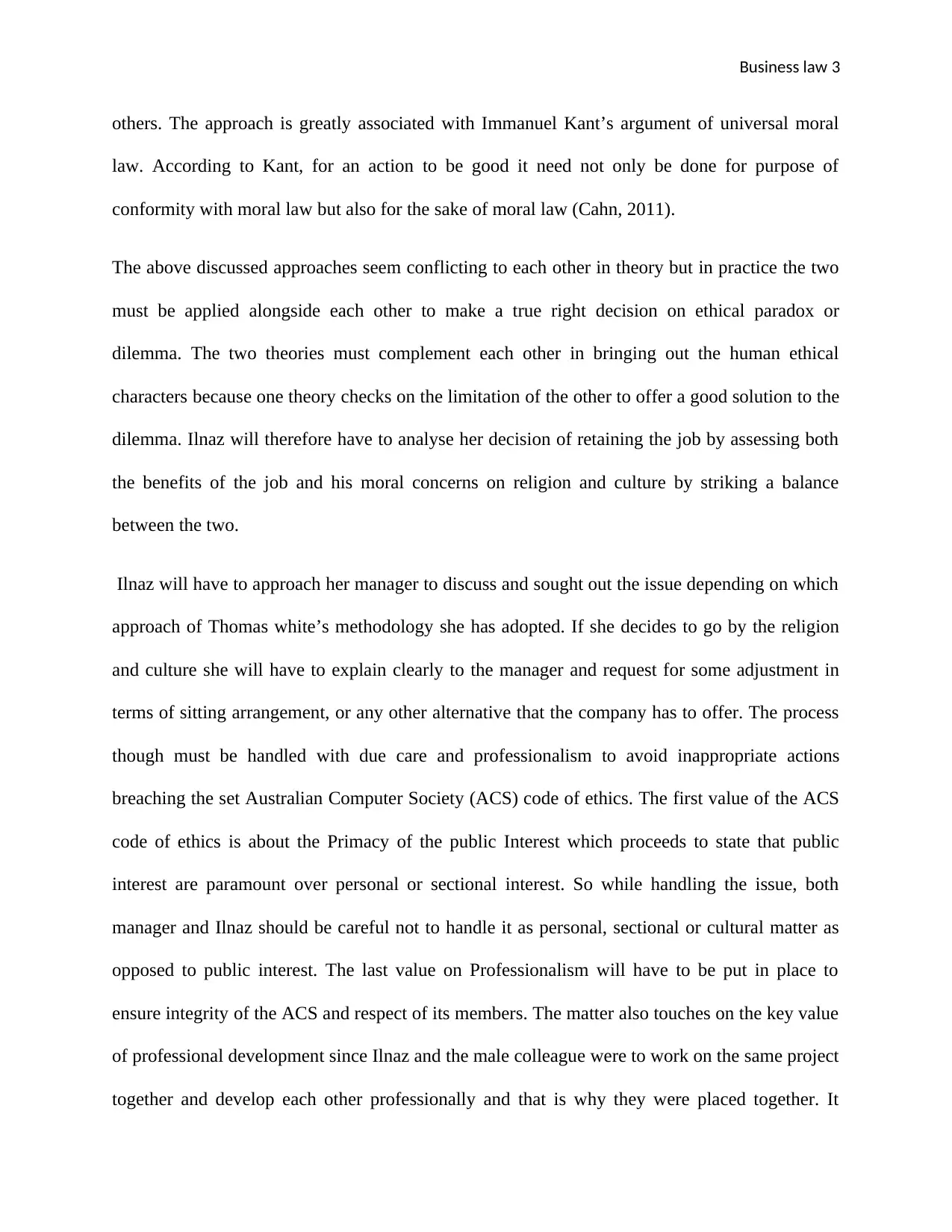
Business law 3
others. The approach is greatly associated with Immanuel Kant’s argument of universal moral
law. According to Kant, for an action to be good it need not only be done for purpose of
conformity with moral law but also for the sake of moral law (Cahn, 2011).
The above discussed approaches seem conflicting to each other in theory but in practice the two
must be applied alongside each other to make a true right decision on ethical paradox or
dilemma. The two theories must complement each other in bringing out the human ethical
characters because one theory checks on the limitation of the other to offer a good solution to the
dilemma. Ilnaz will therefore have to analyse her decision of retaining the job by assessing both
the benefits of the job and his moral concerns on religion and culture by striking a balance
between the two.
Ilnaz will have to approach her manager to discuss and sought out the issue depending on which
approach of Thomas white’s methodology she has adopted. If she decides to go by the religion
and culture she will have to explain clearly to the manager and request for some adjustment in
terms of sitting arrangement, or any other alternative that the company has to offer. The process
though must be handled with due care and professionalism to avoid inappropriate actions
breaching the set Australian Computer Society (ACS) code of ethics. The first value of the ACS
code of ethics is about the Primacy of the public Interest which proceeds to state that public
interest are paramount over personal or sectional interest. So while handling the issue, both
manager and Ilnaz should be careful not to handle it as personal, sectional or cultural matter as
opposed to public interest. The last value on Professionalism will have to be put in place to
ensure integrity of the ACS and respect of its members. The matter also touches on the key value
of professional development since Ilnaz and the male colleague were to work on the same project
together and develop each other professionally and that is why they were placed together. It
others. The approach is greatly associated with Immanuel Kant’s argument of universal moral
law. According to Kant, for an action to be good it need not only be done for purpose of
conformity with moral law but also for the sake of moral law (Cahn, 2011).
The above discussed approaches seem conflicting to each other in theory but in practice the two
must be applied alongside each other to make a true right decision on ethical paradox or
dilemma. The two theories must complement each other in bringing out the human ethical
characters because one theory checks on the limitation of the other to offer a good solution to the
dilemma. Ilnaz will therefore have to analyse her decision of retaining the job by assessing both
the benefits of the job and his moral concerns on religion and culture by striking a balance
between the two.
Ilnaz will have to approach her manager to discuss and sought out the issue depending on which
approach of Thomas white’s methodology she has adopted. If she decides to go by the religion
and culture she will have to explain clearly to the manager and request for some adjustment in
terms of sitting arrangement, or any other alternative that the company has to offer. The process
though must be handled with due care and professionalism to avoid inappropriate actions
breaching the set Australian Computer Society (ACS) code of ethics. The first value of the ACS
code of ethics is about the Primacy of the public Interest which proceeds to state that public
interest are paramount over personal or sectional interest. So while handling the issue, both
manager and Ilnaz should be careful not to handle it as personal, sectional or cultural matter as
opposed to public interest. The last value on Professionalism will have to be put in place to
ensure integrity of the ACS and respect of its members. The matter also touches on the key value
of professional development since Ilnaz and the male colleague were to work on the same project
together and develop each other professionally and that is why they were placed together. It
⊘ This is a preview!⊘
Do you want full access?
Subscribe today to unlock all pages.

Trusted by 1+ million students worldwide
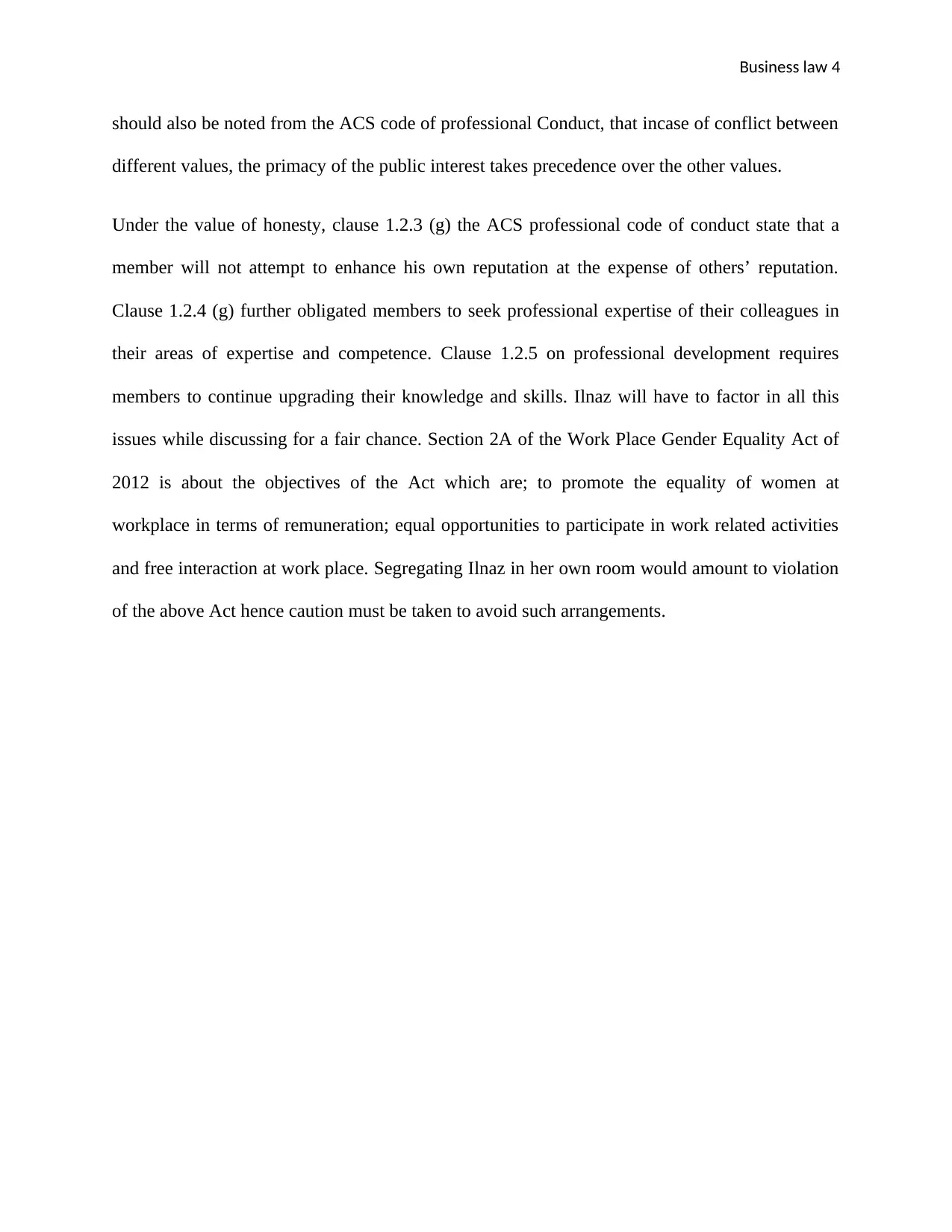
Business law 4
should also be noted from the ACS code of professional Conduct, that incase of conflict between
different values, the primacy of the public interest takes precedence over the other values.
Under the value of honesty, clause 1.2.3 (g) the ACS professional code of conduct state that a
member will not attempt to enhance his own reputation at the expense of others’ reputation.
Clause 1.2.4 (g) further obligated members to seek professional expertise of their colleagues in
their areas of expertise and competence. Clause 1.2.5 on professional development requires
members to continue upgrading their knowledge and skills. Ilnaz will have to factor in all this
issues while discussing for a fair chance. Section 2A of the Work Place Gender Equality Act of
2012 is about the objectives of the Act which are; to promote the equality of women at
workplace in terms of remuneration; equal opportunities to participate in work related activities
and free interaction at work place. Segregating Ilnaz in her own room would amount to violation
of the above Act hence caution must be taken to avoid such arrangements.
should also be noted from the ACS code of professional Conduct, that incase of conflict between
different values, the primacy of the public interest takes precedence over the other values.
Under the value of honesty, clause 1.2.3 (g) the ACS professional code of conduct state that a
member will not attempt to enhance his own reputation at the expense of others’ reputation.
Clause 1.2.4 (g) further obligated members to seek professional expertise of their colleagues in
their areas of expertise and competence. Clause 1.2.5 on professional development requires
members to continue upgrading their knowledge and skills. Ilnaz will have to factor in all this
issues while discussing for a fair chance. Section 2A of the Work Place Gender Equality Act of
2012 is about the objectives of the Act which are; to promote the equality of women at
workplace in terms of remuneration; equal opportunities to participate in work related activities
and free interaction at work place. Segregating Ilnaz in her own room would amount to violation
of the above Act hence caution must be taken to avoid such arrangements.
Paraphrase This Document
Need a fresh take? Get an instant paraphrase of this document with our AI Paraphraser
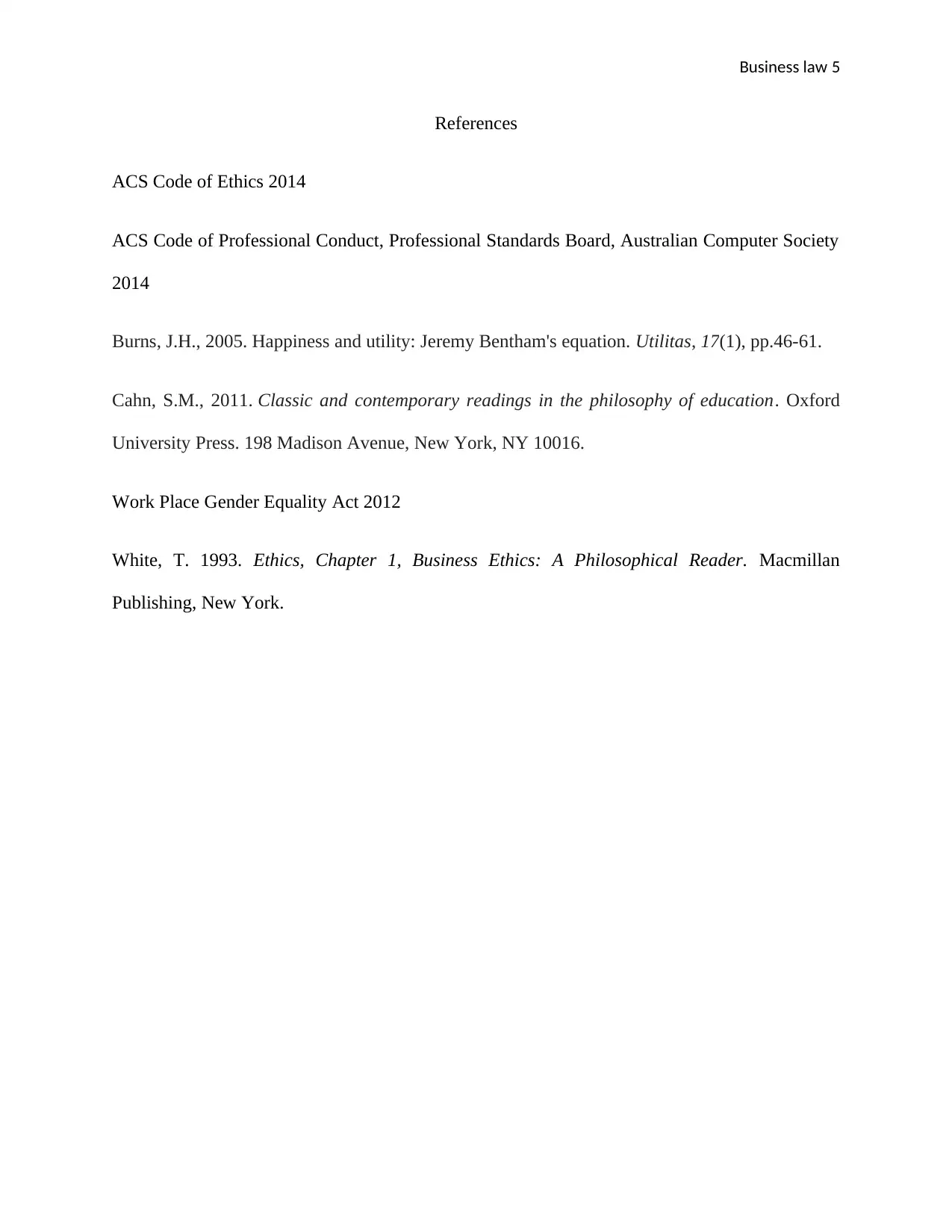
Business law 5
References
ACS Code of Ethics 2014
ACS Code of Professional Conduct, Professional Standards Board, Australian Computer Society
2014
Burns, J.H., 2005. Happiness and utility: Jeremy Bentham's equation. Utilitas, 17(1), pp.46-61.
Cahn, S.M., 2011. Classic and contemporary readings in the philosophy of education. Oxford
University Press. 198 Madison Avenue, New York, NY 10016.
Work Place Gender Equality Act 2012
White, T. 1993. Ethics, Chapter 1, Business Ethics: A Philosophical Reader. Macmillan
Publishing, New York.
References
ACS Code of Ethics 2014
ACS Code of Professional Conduct, Professional Standards Board, Australian Computer Society
2014
Burns, J.H., 2005. Happiness and utility: Jeremy Bentham's equation. Utilitas, 17(1), pp.46-61.
Cahn, S.M., 2011. Classic and contemporary readings in the philosophy of education. Oxford
University Press. 198 Madison Avenue, New York, NY 10016.
Work Place Gender Equality Act 2012
White, T. 1993. Ethics, Chapter 1, Business Ethics: A Philosophical Reader. Macmillan
Publishing, New York.
1 out of 5
Related Documents
Your All-in-One AI-Powered Toolkit for Academic Success.
+13062052269
info@desklib.com
Available 24*7 on WhatsApp / Email
![[object Object]](/_next/static/media/star-bottom.7253800d.svg)
Unlock your academic potential
Copyright © 2020–2026 A2Z Services. All Rights Reserved. Developed and managed by ZUCOL.




